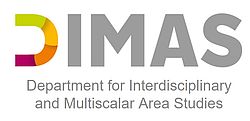Verleihung des Regensburger Area Studies Preises für Masterarbeiten

Am 4. Juli 2024 wurde der Preis zum vierten Mal verliehen. ... mehr

 Das Department for Interdisciplinary and Multiscalar Area Studies - DIMAS ging 2023 aus dem CITAS hervor. CITAS wurde 2017 mit dem Ziel gegründet, die Zusammenarbeit unterschiedlicher Institutionen, Projekte und Forscher:innen im Bereich der Area Studies in Regensburg zu fördern.
Das Department for Interdisciplinary and Multiscalar Area Studies - DIMAS ging 2023 aus dem CITAS hervor. CITAS wurde 2017 mit dem Ziel gegründet, die Zusammenarbeit unterschiedlicher Institutionen, Projekte und Forscher:innen im Bereich der Area Studies in Regensburg zu fördern.
Das DIMAS setzt diese akademische Tradition fort und verfügt über sechs Professuren und weitere Stellen für wissenschaftliche Mitarbeiter:innen. Mehr Informationen zum Department, den angegliederten Professuren und assoziierten Projekten finden Sie hier.

Am 4. Juli 2024 wurde der Preis zum vierten Mal verliehen. ... mehr

Erfahren Sie mehr über die Vorsitzende des DIMAS und Professorin für Soziologische Dimensionen des Raumes in diesem Interview.... mehr
Astrid Ensslin ist die neue Beauftragte für Gleichstellung von Frauen in Wissenschaft und Kunst an der UR.... mehr
Anna Steigemann, Professorin für Soziologischen Dimensionen des Raumes am DIMAS, ist Teil einer Gruppe, der vor kurzem ein Förderungsantrag für das Projekt „Fairville - für faire Städte“ von EU-Horizon bewilligt worden ist. ... mehr

Zusammen mit den Mitgliedern des CITAS-Vorstands und dem Manager des CITAs wurde die Überführung des CITAS in die neugegründete Struktur DIMAS umrissen.... mehr
Vorstand | Board: Prof. Dr. Anna Steigemann and Prof. Dr. Rike Krämer-Hoppe
Geschäftsführung | Manager: Dr. Laura Niebling
Sekretariat | Secretary dimas@ur.de
Tel. +49 941 943 5966 und
Tel. +49 941 943 68537